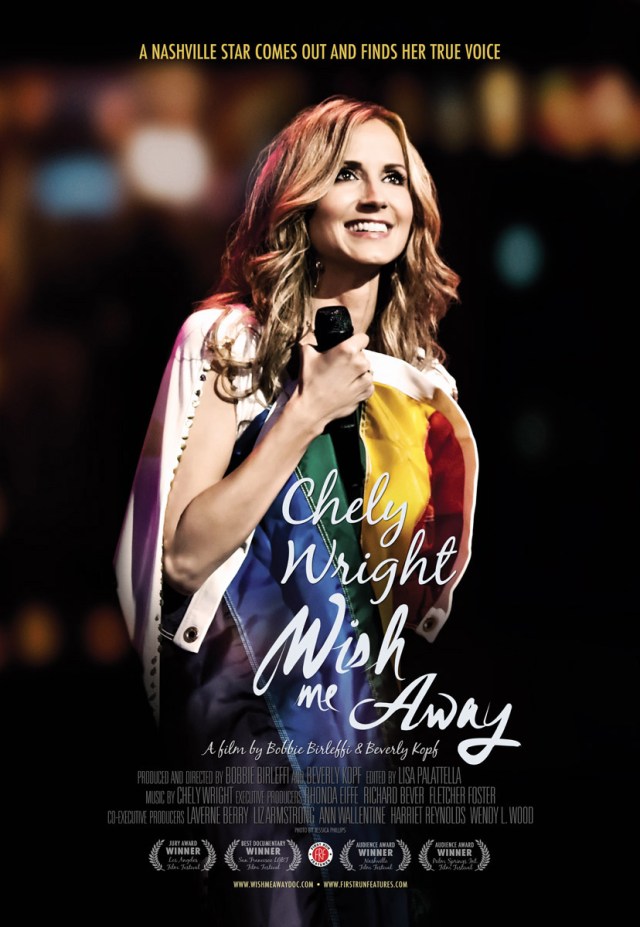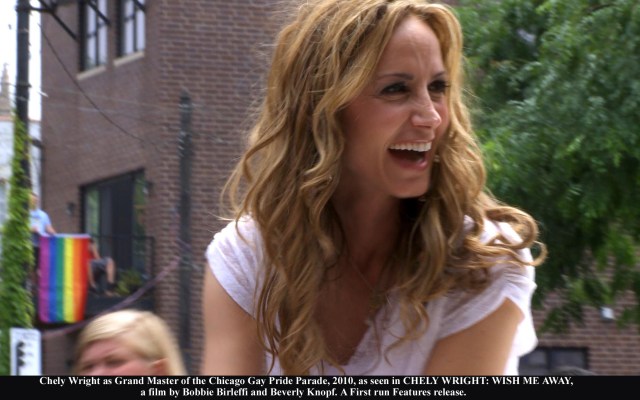Chely Wright’s coming out would be one of the most devastating, naked-making moves of her life. It would threaten her career, her relationships with her peers, and her ability to go home to her family. It would make everything uncertain. It could potentially destroy the entirety of the life she had created.
But it was time.
Chely Wright, an award-winning country music singer and chart-topping Nashville she-ro, found herself heartbroken at rock bottom with a gun in her mouth — and she knew it was time. She had her reasons to be there, I guess: her relationship, which involved one closeted lesbian loving another, had fallen apart two weeks after her own staged heterosexual romance. Her career was extremely successful but didn’t bring her joy anymore. She realized that she had built herself a life she didn’t want to participate in anymore. But before she talked herself out of it, she talked to God.
She found herself feeling lighter and putting out the gun, maybe only so that she could ride her bike for thirteen miles and “find herself.” Where she found herself next was New York and then Los Angeles, making appointments with publicists and publishers so that she could write a book, film a documentary, and masterfully come out of the closet in a way where the door was being torn off of the hinges so hard nobody could look away. She was going to come back to life. And everyone was going to learn something in the process.
When she sat down on The Today Show the day Like Me, her tell-all autobiography, hit the shelves, she sighed and closed her eyes. “It feels like my birthday.”
God gave Chely Wright two lives.
The premise of Chely Wright’s new documentary “Wish Me Away” is just this: you can’t. That Chely Wright herself couldn’t. That every bigot in country music couldn’t. That Chely Wright knew exactly what she was getting herself into when she completely shut off for three years and began a journey to the truth – one so long it would often weigh down on her too much and strain her heart, and one so short she would often not have time to look back or be as scared as she really was. That instead of killing herself she instead looked at herself in the mirror and had a second chance to live. That she chose it, that an honest life tempted her back onto the planet, that it was a moment in which she finally came to love the part of her she had been so afraid to take by the hand and embrace. That she was finally breathing for the first time. That even when she cried, or remembered trying to kill herself, or felt like it was all going to go wrong, she was still present. That she wasn’t going anywhere and still hasn’t. That she had a second life to live.
First she was a country star, her sister said. “Now you’re a lesbian leader.”
“Wish Me Away” follows Chely Wright from her upbringing to the moment she went to Nashville – and then through the history she made there. Packed full of snippets of country music performances and award shows, it simultaneously shows you the life she built as a mask and the painstaking process she underwent to create it. She takes you through her first gay panics and the prayers that wash them away, and into the home she shared with her partner before her suicide attempt. She walks you back through her family tree and she lays out a map of Nashville and which mountains she climbed while she was there, hurtling past everyone else to become a country music supernova.
Then she tells the truth.
As “Wish Me Away” follows Chely toward an extremely public and meticulously organized coming out, there is this remaining fear of loss. You feel it in your stomach as she talks through her fears with professionals, a few key family members, and her therapist. There is a recurring image of her empire set to fall, almost waiting, teetering at the edge as she approaches a doomsday and a birthday all at once. And that’s when it stops mattering.
Wright came out, first and foremost, to live an honest life. We have no choice but to commend her on it after the film, once we’ve already watched her cry and lose her temper and lose control. We feel happy that she chose to do something good for herself no matter what the cost.
But even better are the gains: that she took a turn for activism, that she told her story in order to shine a light on the stories being untold, that she executed a huge coming-out that forced people who never talk about gay people to look one in the face and ask themselves if they would still have her. And that some of them said yes. And that the ones who said no didn’t deter her from focusing on the kids who needed her and the audiences she had to talk to in order to make waves in the world. Even better is that Chely Wright never stopped, never gave up, never turned back. Even before it was too late. That after decades of hiding, she finally told the whole story. That she fell in love. A new story.
This life’s not over yet – but I think it has a happy ending.












Comments
I don’t even like country music but I really want to buy her album now just to make her feel better
Is that bad?
I’m pretty sure Chely’s pretty happy with her life and her decision to come out-I don’t think she’s looking to feel better.
It’s on Netflix for anyone trying to find and watch it!
the movie is amazing!! I saw it in New York When it premiered at Newfest!! Chely is so humble, and honest and vulnerable. I highly recommend the movie.. be ready to cry!!
I loved this documentary, especially as country fan.
I live in Kansas City and I have been volunteering with Chely’s first LGBT center, the LikeMe Lighthouse, since before there was even carpet in the building. I was there for the grand opening weekend and the NOH8 photoshoot and I have to say that Cheky is one awesome gay lady! She’s so nice, adorable, and genuinely wants to help people. I know first hand that her Center has helped tons of people in Kansas City and the Midwest! I went to a screening of Wish Me Away during the grand opening weekend and it’s such a beautiful and heartbreaking story. I also have her book. If you have not read the book or seen the documentary, I highly recommend both!
I read Chely’s book at a really weird time in my life. After I finished it, I came out for the first time. I really enjoyed the documentary too. Quite thankful for her truth and courage.
she’s like a lesbian phoenix rising from the ashy burden of a perfect southern singing belle
I saw the film at last year’s Milwaukee Film Fest, and it was life-altering for me. I related to Chely’s story in a lot of ways and am really grateful for her sharing it–I only wish I had something like this film at an earlier stage in my life!
Her book is also wonderful.
I completely understand what she means when she said it felt like her birthday. I think there is that moment in the lives of every LGBTQ person in this world, where you take that first step out of the closet and it feels like the weight of the world is off your shoulders. You can breathe fully for the first time and see the world in a different way and even if it’s just for a little while it seems like you are are looking at world through the most beautiful and clear rainbow colored glasses in existence.
Her interview on Oprah was pretty great too. It really helped me as I started coming out.
http://vimeo.com/11907126
Thank you so much for linking this.
Yeah, this documentary was amazing. SO MANY FEELINGS
You were so right about all of the feelings! I was looking for something to fit my crampy, PMS riddled, post break up mood. After the trailer alone made me tear up I had to watch it. So good, and now I have a break up anthem that I appreciate unironically, though I generally only like country from the Patsy Cline era. Yeah, “It Was” among many other things about this movie made me cry. And I’m ok with that.
so many feelings.
I am from India and am really depressed right now coz first, i can never be out to my parents and second i don’t even have any near support with whom i can share my heart.
You know right now i was watching BIGG BOSS (BIG BROTHER INDIA) and there were two women who fought coz one was calling her a dirty dyke! And this another female contestent was yelling like-WHAT DOES SHE THINKS, I AM NOT A DIRTY LESBIAN! NO ONE CAN ASSASSAIN MY CHARACHTER LIKE THAT.
And the other female contestent said that she was just joking that it was a task to appear nasty so she was behaving like an ugly lesbian. And this female contestent calls herself feminist!!
Now this is the samee BIGG BOSS which always have male gay contestent, but nobody calls them dirty. So only being a lesbian is dirty and not being gay?
I am not angry but am really depressed right now coz i feel so alone and somehow i feel like really am i so ugly or dirty or abnormal?
I dont even know how to deal with homophobia of this kind coz i don’t have access to other lesbians so dont know how they deal with this.
I was so depressed and was looking for something, i know about ur site and bunch of others coz i frequent here and luckily i have internet. Thank God that you folks are here so i feel somewhat not lonely but still i really need to talk to somebody who can tell me how to handle homophobia and not take such bullshiits to heart coz i am okay if a man makes fun of me but when women do that then i feel really bad.
And i do get such comments from women. Like am a freak coz i luk like a boy or they would simply laugh when they look at me coz they guess who i am. One even said that i am trying to be a man but i am mistaken coz i don’t have a dick.
I feel very low. I am not seeking sypathy but i really really need some good advice how to avoid such comments and move on with life coz now it’s affecting even my career and sleep. Coz whole night either i cry of recall all that was said and then i feel depressed and don’t want to work.
I am sorry for such long post but i am really depressed right now.
And sorry for my stupid english.
thnks
Jyoti, I am so sorry you feel so alone. My name is Deb, but I also have an Indian name (Jyoti!) and am married to Savita, who was born in New Delhi. Her youth was spent feeling exactly as you do.
Wish you could come here to California and find peace, but it’s a pretty exciting time to be gay in India, also! I predict great things
for LGBTQ folk over there. If you want to talk by message, I am here!
So, watched the documentary (thanks iTunes). Wow. really spoke to me. exactly how I feel about being out and being Christian (not quite the country music part!).
Keen to read the book but do you think I can get my hands on an ebook copy available in Australia? It’s been out for two years and its not even real here :(
At least the doco made iTunes